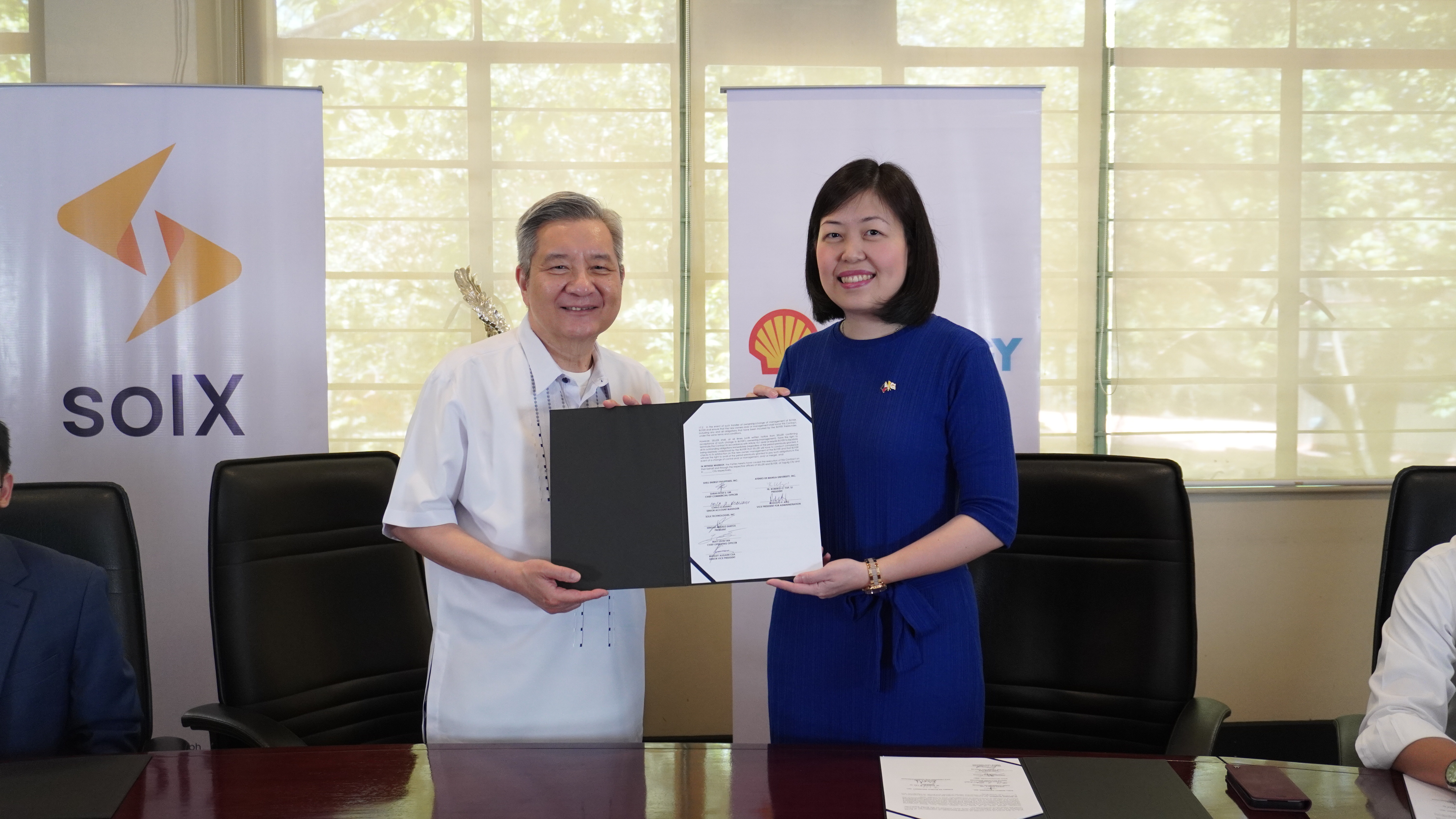AS THE Ateneo shifts to 100% renewable power, demands to ensure a legitimate and clean transition loom over the University. The national and global rise of “sustainable” projects that merely inflate and greenwash commitments to climate action has created an air of skepticism, calling some green projects into question.
With a history of questionable operation practices, Shell—the country’s largest petroleum company—now bears a role in the energy supply partnership, which is continually scrutinized by Atenean stakeholders and external observers alike.
To a sustainability-focused campus agenda, the partnership represents more than a commitment to total renewable energy; its response reflects a growing movement to probe questionable sustainability practices and their greenwashing tendencies.
The partnership explained
The recent Supply Agreement partnership is the University’s latest commitment to becoming a carbon-neutral campus by 2030—an initiative pioneered by the Ateneo’s adherence to Pope Francis’ Laudato Si’ Journey towards Integral Ecology.
According to Vice President for Administration Rodolfo Ang, efforts to develop on-campus renewable energy systems align with the University’s goals of achieving 100% sustainable campus electricity.
Ang specified that the University launched its pilot renewable energy projects in 2022. Previously, the initiative enabled the campus to internally source 10% of its energy from solar grids. However, he asserted that solar power alone may be insufficient to meet their energy targets within their ideal timelines.
To achieve the University’s desired energy independence threshold, Ang stressed the need to find a supplier capable of providing enough energy to meet the Ateneo’s energy projections throughout its annual seasonal operation. As such, the University commissioned SolX Technologies Incorporated—a startup co-founded and run by Ateneo alumnus Sergius Santos (BS ECE ‘17)—to locate a suitable third party and broker a Supply Agreement partnership.
Santos cited regulations in the Electric Power Industry Reform Act of 2001 as a basis for SolX’s recommendation. He maintained that clients such as the Ateneo are legally prohibited from sourcing energy directly from electricity generators, and that a broker such as SolX was required to competitively source a supplier following the University’s energy requirements.
Shell’s position as the final choice emerged with SolX’s conclusion that the company boasted the energy portfolio necessary to provide 100% renewable energy sourcing. With sizable investments in the solar and hydroelectric industry, he defended the choice to partner with Shell, citing their “technical knowledge and expertise” in renewable energy management.
Despite Shell Energy Philippines’ warm welcome into the University partnership, the Ateneo community—alongside some environmental groups—remains unconvinced of the energy company’s promises, primarily due to its actions and investments outside the Loyola Schools campus.
On Shell and greenwashing
Amid shared uncertainties, Greenpeace Philippines raised concerns over Shell’s supposed guarantees of a 100% renewably-sourced energy supply for the Ateneo. As one of the leading environmental advocacy groups in the country, it claimed that Shell is a contributor to climate pollution.
In its 2022 report, the Commission on Human Rights of the Philippines also considered Shell to be a “carbon major.” This refers to major fossil-fuel companies that contribute a great part in the climate crisis due to their “record-setting carbon emissions.” Greenpeace Philippines reported that Shell, along with other carbon major companies, contribute 21.4% to global carbon emissions.
While Shell has promised to prioritize renewable sources of energy in response to climate concerns, the conglomerate has also acknowledged that a total shift to cleaner energy is near impossible. In 2013, Shell plc Chief Executive Officer Wael Sawan admitted that the high demand for such resources—alongside reducing oil and gas production—could have significant impacts on the cost of living and energy distribution in developing countries.
In a roundtable discussion held at the University on June 24, representatives from Shell Energy Philippines also disclosed that their energy portfolio is not entirely renewable. They argued that the high demand for energy in the Philippines would render complete divestment from fossil fuel “impossible,” echoing the stance of their majority-owner parent company.
According to Greenpeace Climate Campaigner Jefferson Chua (AB PH ‘12), Shell’s Philippine division makes no effort to relinquish its dependence on oil imports from internationally-owned and operated marine oil fields. Such claims, as asserted by Chua, implicate Shell Philippines’ operations on the controversial practices of its parent company.
“[I]t is not just business-as-usual practices; they’re [actively] expanding their fossil fuel portfolio,” Chua observed.
Shell plc’s commitments to green energy came with increases to its annual fossil fuel investments. In 2023, the company pledged USD 40 billion in oil and gas production between 2023 and 2035. This was after it previously promised to achieve net-zero emissions by 2050 through strategic investments in renewable and “low-carbon” products.
Following this, Shell’s 2024 Energy Transition Strategy highlights its investments in electric-vehicle charging, along with other energy alternatives that help meet the net-zero emissions goal. The company had promised to invest USD 10–15 billion in these “low-carbon energy solutions,” and stressed its subsequent efforts to divest from certain oil production sites in the United States, Canada, Brazil, Nigeria, and Malaysia.
In addition, Shell proposed carbon-neutral liquefied natural gas (LNG) as a supplemental non-carbon source. LNG, a condensed derivative of fossil fuels, produces lower carbon emissions compared to other fuel mediums. However, it still emits significant amounts of methane, a prominent greenhouse gas.
Chua suggested that this practice was consistent with Sawan’s statement, stating the observed increase in investments in fossil gas. “[T]he industry usually calls it natural gas to make it sound better. [I]t is essentially fossil gas and has eight times more methane emissions, which is worse. [Yet], we see a lot of that investment,” Chua commented.
Nevertheless, SolX endorsed these commitments, citing Shell Energy Philippines as one of the renewable energy suppliers certified by the Department of Energy. Aside from written documentation, however, no further avenues for verification were presented for the Ateneo to assess its partners’ performance in delivering 100% renewable energy.
Accountability amid uncertainties
With the Loyola Heights campus now on the new energy supply line until 2026, the administration continues to search for a similar renewable energy supplier that is more suitable for the lower energy demands of Ateneo’s Rockwell and Salcedo campuses.
Notably, fellow Jesuit institution Xavier School San Juan engaged in a similar energy supply partnership earlier this year—also brokered by SolX.
Chua suggested that for the University’s initiative to be achieved, Ateneo must conduct specific monitoring to ensure that the implementation of Shell, alongside SolX’s promises, is aligned with the partnership’s sustainability goals.
On the administration’s side, Ang stated that the two-year partnership in itself contributes greatly to the University’s commitment to carbon-neutrality by 2030. The lasting effect of the partnership on Atenean campus sustainability, however, is yet to be observed.
Overall, the skepticism surrounding the reputation of Shell Philippines is seemingly worth enduring for the administration in its bid to achieve its total renewable energy timeline. As the shift serves as an initiative to promote campus sustainability, its impact on the University’s goals—and the precedent it may set for other Philippine institutions—will be one to note for future environmental initiatives.




